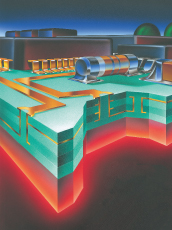Technical Copywriting:
the best way to communicate your value proposition to engineers
Technical copywriting falls somewhere between the glossy, high-concept, general capabilities brochure and the down-and-dirty “spec” or data sheet.
The middle ground between these two extremes can be perfect for persuasive sales writing, even if the subject is technical.
The prospect needs to understand, in a clear and compelling way, how the technical product will improve her job like no other product; that is, its unique value proposition. This is the job of the technical copywriter.
Let’s first look at the main target of technical copy: engineers. Skeptical engineers.
Engineers are an intelligent bunch. But they don’t like being sold to — at least not on a conscious level. Instead, your typical skeptical engineer expects a rational case to be made for a technical-industrial product, system, or service.
The problem is, engineers are information junkies. They’re overloaded with data. To make your rational case, you must first break through their information overload. And it had better be with an on-target, problem-solving message that both “hooks” their imagination and is technically admired.
How a technical copywriter works
No matter what the technical product is, frequently the copywriter has to start with raw data . . . or even less! Often the information needed for comprehensive marketing materials exists only in the minds of several different product engineers. A good technical copywriter extracts that information — patiently, methodically — through interviews.
Another situation is when a company has written dozens and dozens of bulleted features and benefits, thinking this is technical copywriting. It isn’t. There’s a time and a place for such lists, maybe next to the specifications tables. But a technical copywriter uses a feature/benefit list as a starting point.
Features and benefits need to be woven together into a coherent business case for the technical product
Most importantly, a unique value proposition must be identified. That value proposition must then be verified against the sales force’s real-world experience and actual end-user interviews. And all company assumptions about their product, the market, and its competition must be objectively reviewed vis-à-vis actual end-user feedback.
The technical copywriter works with product engineers and product managers to develop a high-impact, engaging value proposition.
All of the tools of good technical copywriting are deployed: answering the five W's and one H (who, what, when, why, where, and how); providing case histories and testimonials; displaying ROI calculations; making suggestions for vivid depictions of the value proposition; and developing a personality, an image, for the product that latches onto the minds of the target audience.
Technical copy can and does use some technical data to help persuade engineers and decision makers. But comprehensive technical specifications should be in their own section of a piece, or in their own piece, for the simple reason that specification tables are viewed and used differently than the technical copy. That’s why it’s common for a piece to have the following sequence: establishing the company’s credentials, technical copy making the business case for the product, and then the complete product specifications.
Do technical companies use enough technical copy?
Usually not. Many technical companies have just a general capabilities brochure and product spec or data sheets, with nothing in between. Or, they have very short “sales flyers” with maybe an ad reprint on the front and some technical specifications on the back, never fully developing a case for a unique value proposition. Many of these companies honestly believe that “our product’s technical specifications speak for themselves.” They don’t. They need the support of a business case, and that can only be done using either a flesh-and-blood salesperson or through technical copy.
Write it yourself or hire a copywriter?
Whether you write it yourself or hire a professional technical copywriter, the goal is the most meaningful treatment of your technical product’s value proposition.
In either situation, writing technical copy is hard work requiring large blocks of time to concentrate in a quiet, undisturbed space. Realistically evaluate if your schedule or experience lends itself to producing world-class promotional copy. If not, interview several professional copywriters specializing in technical-industrial copy.
Hire the copywriter with the best chemistry for you and your company. If they have experience in your industry, great. But if you’re really communicating well with an industrial copywriter that doesn’t have experience in your industry, ask them how they approached a similar project for another technical industry. An experienced professional should be able to come up with a number of appropriate examples.
Personal chemistry, listening skills, attention to details and deadlines, and the ability to write copy that moves a prospect down the sales funnel are key attributes for a technical copywriter. Give your new copywriter a small to moderate-sized job to test how well you work together.
To discuss how my freelance technical copywriting experience can improve your marketing communications, call or email me to schedule a no-charge business-to-business copywriting consultation.
